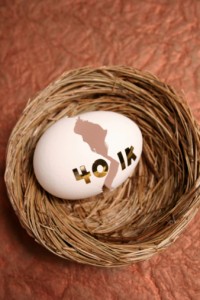 The WSJ (subscription required) reports in “Schwab’s Bold Bet on ETFs” that the brokerage firm soon would offer 401(k) retirement plans solely stuffed with ETFs—and let investors trade them without charge:
The WSJ (subscription required) reports in “Schwab’s Bold Bet on ETFs” that the brokerage firm soon would offer 401(k) retirement plans solely stuffed with ETFs—and let investors trade them without charge:
ETFs, which typically carry low fees and trade like stocks on exchanges, have exploded in popularity, a rare source of growth in the otherwise stagnant mutual-fund industry. ETFs now hold a total of $997 billion in assets, up from $65.6 billion a decade ago. Still, ETFs have yet to make a dent in employer-sponsored 401(k) accounts, a $2.8 trillion market.
Schwab, just a bit player in 401(k)s now, sees ETFs as a way to edge closer to giants such as Fidelity Investments, Aon Corp.’s Aon Hewitt and Vanguard Group. According to consulting firm Cerulli Associates, those three had a combined market share of about 43% in 2009, the latest year for which data are available.
Schwab doesn’t disclose publicly how much of its $4.2 billion in annual revenue comes from the 401(k) business. Cerulli ranks the San Francisco company 10th by assets, at $72.5 billion.
Many 401(k)s, particularly those offered by Vanguard, already offer a thick menu of low-cost index mutual funds. So Schwab’s main targets are companies where 401(k) plans consist largely of actively managed mutual funds. Such funds charge higher fees than index funds or ETFs.
Adding ETFs to 401(k) plans could put more pressure on actively managed fees, a trend that began with the introduction of index funds in the 1970s.
“Moving to an ETF-based 401(k) program is something new and certainly could have profound impacts for the asset-management industry,” says Alex Kramm, an analyst with UBS Securities.
ETF critics say the offerings can be more volatile than regular mutual funds, as seen in last year’s May 6 “flash crash,” when some ETFs briefly plummeted to near zero, only to roar back moments later. And because ETFs can be bought and sold at any time in the trading day, rather than just once a day like regular mutual funds, ETFs tend to encourage rapid-fire trading, critics say. ”
…
“For a long time, people haven’t been able to figure out the ETF and 401(k) mix,” says Schwab Chief Executive Walter Bettinger. “I think we’re the one company who is entrenched in the industry today who has a motivation to do so.”
Rival TD Ameritrade Holding Corp. began offering ETFs in April to plan sponsors and 401(k) participants alongside standard mutual funds. Fidelity last year began offering some commission-free ETF trades in an effort to build up its brokerage operations.
To allay concerns about ETF risks, Schwab plans to provide investors with access to financial advice. The company also will let plan sponsors offer a menu consisting solely of index funds. Schwab officials are discussing, among other options, a partnership with Financial Engines Inc., a provider of retirement advice launched by Nobel Laureate William Sharpe that would provide Financial Engines’ advice to Schwab customers, according to people familiar with the matter.
Mr. McCool says the advice will buffer aggressive trading, adding that investors will appreciate the transparency of seeing an ETF’s holdings at any given moment.
While some ETFs are sophisticated products geared toward active or professional investors, Schwab says it will stick to plain-vanilla index ETFs, including domestic and international stocks and bonds.
The company will offer ETFs issued by Schwab and other firms. Schwab is a small issuer of ETFs, with about $4.2 billion in assets, or less than 1% of the market, according to a report from BlackRock Inc., the largest ETF provider.
Schwab, of San Francisco, expects to begin meeting with plan sponsors this fall.
I believe the critics of this plan have predominantly nothing but self serving interests at heart. Schwab’s move will only be the first step, with other companies certain to follow, as it would undoubtedly make buying and selling of your 401k holdings a snap.
With this proposed set up, you could then actually make intelligent investment decisions by implementing the use of trailing sell stops and following trends in the market place, without being affected by silly trading restrictions and short-term redemption fees.
That’s why I think the argument of investors tending to quickly trade in and out, given the opportunity, is hollow. There is much more at stake here and that is the threat of fund companies losing revenue big time, if these low cost 401k plans spread and eventually offer a real alternative to the current “old boys” club.
That’s my view, what’s yours? Feel free to leave your comment below.
Contact Ulli
Comments 2
The sooner the better. With my employer’s 401k plan, I can only make changes once per week (I can request to change holdings at any time…but the changes only become effective at close on the following Tuesday). This obviously throws a wrench into my use of the trend-tracking method.
John,
Yes, that is a pathetic restriction to limit you from making an intelligent decision about your investments. I really like to know if there are worse restrictions out there…
Ulli…